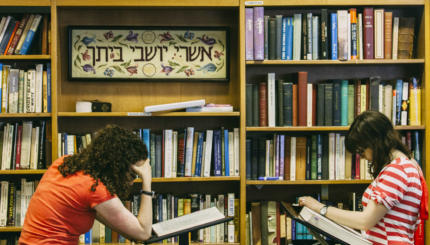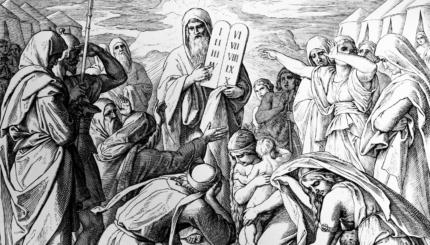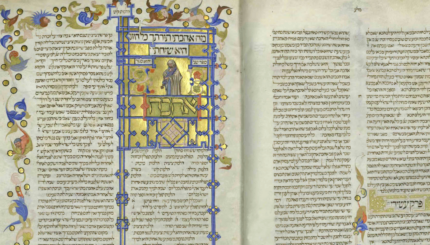This is a continuation of Friday’s post. In part 1, Bracha explained the background for the question and here she concludes her analysis.
—
This year, I embarked on my first halakhic investigation as a Yeshivat Maharat student, researching the question of whether visitors from Israel should observe one or two days of a holiday when traveling outside of Israel. As I explained in my previous post, the Chacham Tzvi rules that a resident of the diaspora who travels to Israel for a holiday should observe the holiday for one day only.
The next step in my journey was to research the Chacham Tzvi in the opposite direction – for a person traveling from Israel to the diaspora. Interestingly, he does not address this issue directly. So instead I turned to other poskim, halakhic decisors, and looked for responsa and rulings of authorities who follow the Chacham Tzvi’s ruling regarding visitors to Israel to see if and how they used this logic to address the question regarding visitors to the diaspora.
Here came the big surprise! While rabbis such as Rav Chaim Soloveitchik
[1]
, Rav Avraham Yitzchak Ha-Kohen Kook, and Rav Tzvi Pesach Frank agree with the Chacham Tzvi that everyone should observe one day in Israel, almost no one uses this logic in the opposite case
[2]
. If we were to follow the Chacham Tzvi’s logic, a visitor from Israel to the diaspora should observe two full days of the holiday, the custom of the place she is visiting. But the majority of rabbis do not rule this way.
Rav Tzvi Pesach Frank
[3]
explains beautifully why this is not the case. He writes that nowadays, after the Jewish calendar was established, communities in the diaspora are no longer observing two days because of inherent doubt as to which is the correct date. The underlying reason for observing two days has changed from a rabbinic requirement to a communally obligatory
minhag
(practice); one that is incumbent on communities in order to respect memories and preserve customs over time. Our sages wanted to make sure that if there were ever a time in the future when doubt about the correct date led to a need to observe two days, communities in the diaspora would know what to do. Therefore, a visitor from Israel would not be required to observe two full days of the holiday as it is incumbent on the community but not on a passing visitor. I was pleased to see that this followed the ruling of the Shulchan Aruch as well.
Now the question remained as to how one defines a visitor? When does one become an integrated part of their new community? This, too, required research and I found a plethora of opinions. There are those who say that if the visitor owns a home in Israel, is absolutely planning on returning to Israel to live, and never entertained the thought of staying in the diaspora – that is enough to grant them “visitor’s status” when they are in the diaspora and they should therefore observe only one day when traveling outside of Israel.
One responsum explaining the categories of resident and visitor that resonated especially well with me was from Rav Eliezer Melamed
[4]
. He says that if an Israeli is going abroad for an undetermined amount of time of at least one year, that person immediately becomes part of the diaspora community (particularly if the person’s family comes along). However, if the Israeli is going for a specific purpose, then it depends on the amount of time she will be away. As Rav Melamed notes, most courses of study and shlichut, emissary work, range up to four years, so he suggests that anything longer than that period would constitute an identity shift from “visitor” to permanent “resident,” which would require observing two full days of the holiday.
Upon returning to answer this question for my own situation, I applied Rav Melamed’s criteria. I realized that although Yeshivat Maharat is a four-year program, I came to the U.S. a full year before it started, bringing my total stay up to five years. It felt odd, yet strangely correct to have a second seder and to observe eight days of Pesach this year while my children visiting from Israel observed only one day of the festival (and therefore a seven-day Pesach). My halakhic integrity had come home.
My halakhic journey has been empowering, exciting and enlightening. This is why I am on this path; this resonates with my soul and is fuel for my passion. With God’s help I look forward to many more journeys such as this one – for individuals and for sharing with the larger community as well.
The Jewish world is full of debates. Get the latest in MyJewishLearning’s weekly blogs newsletter.
[1] Reshimot Shiurim, Sukka, p. 226
[2] The Baal HaTanya was the only one I found to rule that Israelis should observe two full days.
[3] Har Tzvi 3:78
[4] Pninei Halacha: http://revivim.yhb.org.il/2013/02/
Avraham
Pronounced: AHVR-rah-ham, Origin: Hebrew, Abraham in the Torah, considered the first Jew.
Pesach
Pronounced: PAY-sakh, also PEH-sakh. Origin: Hebrew, the holiday of Passover.
seder
Pronounced: SAY-der, Origin: Hebrew, literally “order”; usually used to describe the ceremonial meal and telling of the Passover story on the first two nights of Passover. (In Israel, Jews have a seder only on the first night of Passover.)



